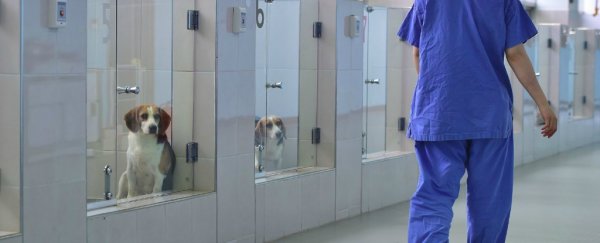The Sooam Biotech Research Foundation can reincarnate your dead dog, a service that would delight pet lovers - for US$100,000.
"These people have very a strong bond with their pets … and cloning provides a psychological alternative to the traditional method of just letting the pet go and keeping their memory," said Sooam researcher and spokesman Wang Jae-Woong.
They specialise in cloning cattle and pigs for medical research and breed preservation as well, particularly developing genetically-engineered animals for use as disease models.
But it is their dog cloning service that brings in the most customers: they've cloned almost 800 dogs since 2006, with their client base including princes, celebrities, and billionaires, as well as owners and agencies who want to replicate highly skilled sniffer and rescue dogs.
The process starts with putting your dead dog in the fridge - not the freezer, just the fridge. Oh, and don't forget to wrap it in wet towels too.
Within about five days of your dog being delivered to the facility, a mature cell from the dog can be successfully harvested, and copied; the DNA is then fused with a donor egg that has been stripped of its original genetic material.
The embryo from this process is then implanted in a surrogate mother dog. Two months later, your dead best friend is back to being a puppy.
Sooam's most publicised project was its creation of five clones of Trakr, a rescue dog that found the last survivor of the 9/11 World Trade Center tragedy. It also conducted collaborations with other cloning facilities, such as BioArts International, which has since opted out of the dog cloning market.
Now the company is partnering with other researchers in an ambitious plan to clone a mammoth from frozen remains found in Siberia.
While cloning in itself is already a hotbed of debate, Sooam's founder Hwang Woo-Suk has a notorious past, further bringing the company's moral and ethical foundations to question.
In 2004 and 2005, he published a claim stating he has successfully derived stem cell lines from cloned human embryos. This was later found out to be a hoax. The scandal revealed numerous ethical violations.
In 2009, he was served a two-year suspended prison sentence for embezzlement and bioethical violations.
"I think the only way to win the public's trust back is making more genuine scientific breakthroughs," Hwang said.
Head researcher Jeong Yeon-Woo says Sooam's dog cloning service remains as the company's most fulfilling facet.
"They look like they found a child that had been missing," Jeong said. "The moment of pure joy like that … makes me realise again why I'm doing this."
This article was originally published by Futurism. Read the original.
